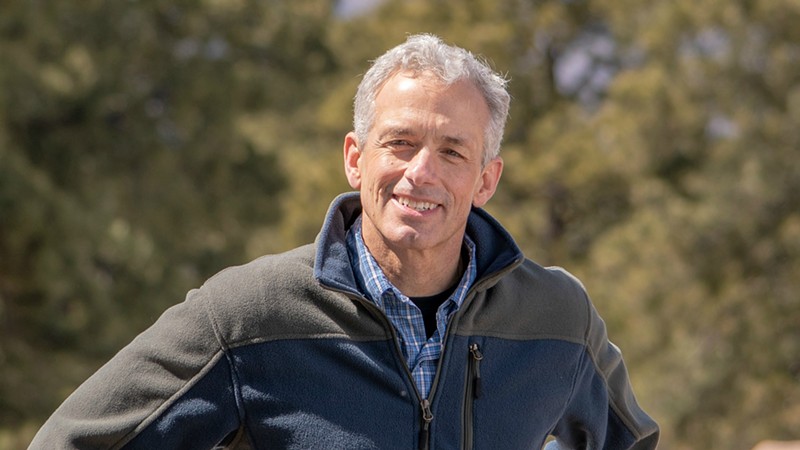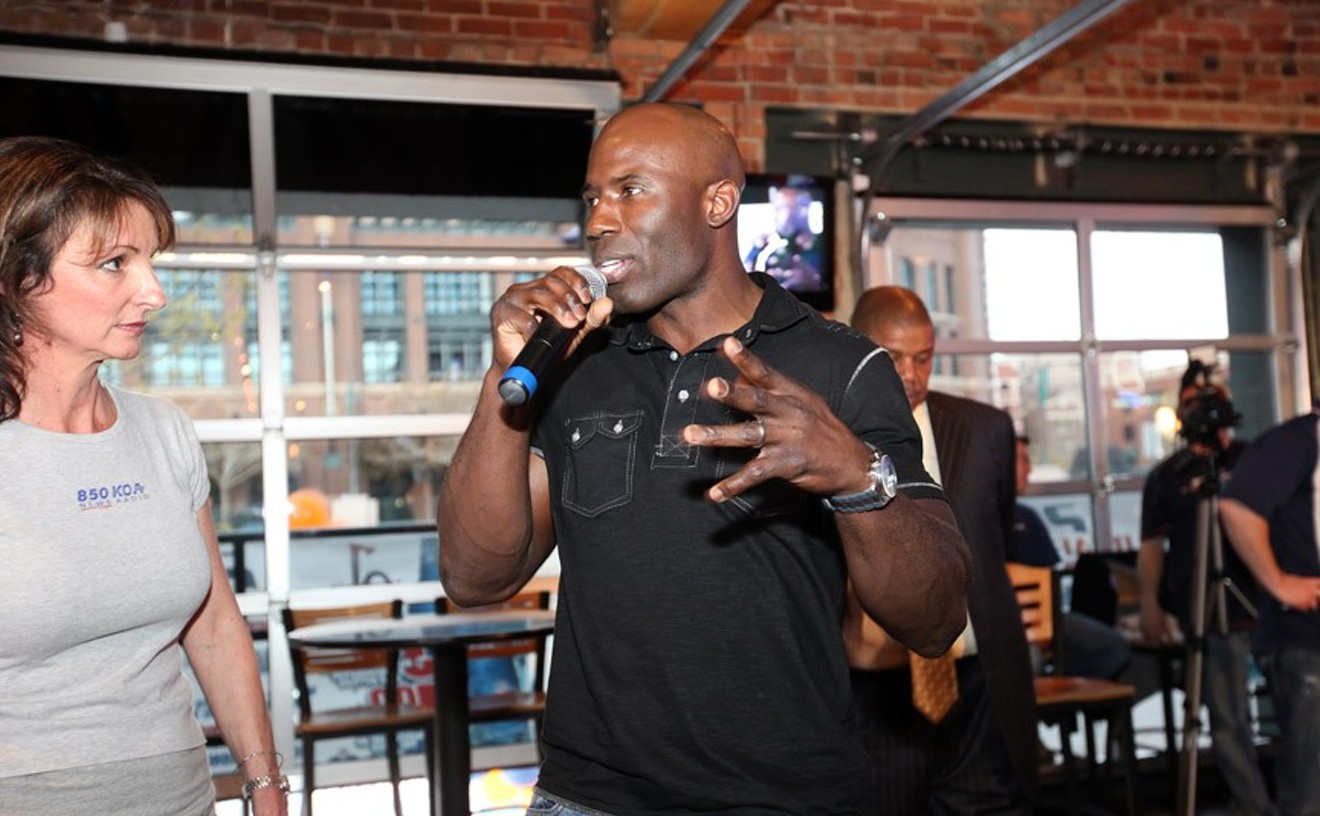"I am in this race because I want to be a fierce advocate for the people of Colorado in the U.S. Senate," Walsh says, "and I think I've got the background, the progressive record and the skills to do that."
The field of hopefuls eager to replace Gardner is ten strong. In addition to Walsh, they include former state senator Mike Johnston; onetime speaker of the state House Andrew Romanoff; ex-U.S. ambassador Dan Baer; and Stephany Rose Spaulding, who gave District 5 Representative Doug Lamborn a spirited run in 2018; plus Denver's Lorena Garcia and Dustin Leitzel, Grand Junction's Keith Pottratz, Englewood's Diana Bray and Superior's Trish Zornio.
According to Walsh, "I moved to Colorado when I was twelve, and this is my home. I've spent the majority of my life here. I went to Cherry Creek High School and I raised a family with my wife, Lisa, here in Colorado. Even when I went away to school [he attended Massachusetts's Williams College and Stanford] and worked in California for a bit [as an Assistant U.S. Attorney in Los Angeles], there was no question that we were coming back."
In 1995, Walsh returned to Denver to join the Holland & Hart law firm and became a partner two years later before leaving in 1999 to join Hill & Robbins, P.C. He also ran for Denver District Attorney in 2004, but fell short despite earning the endorsement of the Denver Post. Then, in 2010, he was appointed U.S. Attorney, and he stayed in the post until 2016 — a notably lengthy stint for the position.
Among the cases he worked on during this period was one in which "our office and the U.S. Attorney's Office in Massachusetts partnered to bring both civil and criminal penalties against [pharmaceutical giant] GlaxoSmithKline for, basically, the off-label marketing of drugs. In other words, the FDA approves drugs for one use and, at times, companies have gone out and pretty aggressively marketed them for unapproved uses. That's what this case was about, and it involved some very popular and important drugs, including anti-depressants, that they were marketing for all sorts of things, such as weight loss." The settlement ultimately tipped the scales at around $3 billion.
He also cites his efforts as "one of the national co-chairs of the working group put together by the Department of Justice and President Obama to look at the misconduct of big banks during the financial crisis of 2008. Here in Colorado, we won a $7 billion resolution and penalty against CitiBank. And our office was successful in getting a $150 million penalty and monitor imposed on McKesson, one of the principal opioid manufacturers. Our office was the lead, and it was the largest penalty ever brought against an opioid distributor up until that time." The case was resolved in January 2017 under the watch of Walsh's immediate successor, Acting U.S. Attorney Bob Troyer.
These cases were well publicized, but in Denver, the Walsh action that arguably received the most attention involved seizure letters his office sent to medical marijuana businesses located near schools beginning in January 2012, prior to the legalization of limited recreational cannabis sales. Recipients were informed that if they didn't move their operations more than 1,000 feet away from schools within 45 days, they faced the likelihood of their shop being forfeited to the feds. At the time, many in the MMJ community feared the letters were the first step toward a broader federal crackdown, with Walsh leading the charge. But Walsh insists that these moves were actually made to help Colorado get more of a grasp on how to manage an industry that would explode later that year with the passage of Amendment 64, which legalized limited recreational cannabis sales.
Once A64 passed, Walsh says, "we understood from that point forward what the landscape was, and we worked closely with Governor Hickenlooper and state regulatory authorities to make sure that brand-new industry would be able to function. And I felt strongly that there were things the federal government could do to ensure that the system would protect public health and safety while implementing the will of the people of Colorado."
Prior to legal recreational marijuana sales, Walsh continues, "regulations were being developed by the State of Colorado, but there wasn't yet a system in place for enforcing all of them — and there were hundreds of dispensaries located right by schools. So rather than just going in and starting to prosecute all those dispensary owners, we sent the letters. And I count that as one of the successes in our efforts to help Colorado move forward to an effective regulatory system. Ultimately, we didn't have to bring enforcement action against any of the dispensaries, because they all moved — and that was consistent with Colorado rules about where a dispensary should be located."
His office was "always focused on making sure Colorado had federal support for implementing a system while protecting the people," he maintains. "And as early as 2014, I advocated for a close partnership between federal and state authorities to make this work. There have been some hiccups with the change of administration, but I think the State of Colorado is continuing to head in the right direction, and I hope the federal government continues to be in support of that. But I'm proud of the work we did."
After stepping down as U.S. Attorney, Walsh returned to private practice as a partner in the Denver office of the WilmerHale law firm, where he continued to pursue public-service goals. Earlier this year, for instance, he was among the WilmerHale attorneys honored by the Rocky Mountain Immigrant Advocacy Network for their work representing undocumented parents separated from their children due to the family-separation policy pursued by President Donald Trump. But he credits a different Republican with serving as the impetus to him becoming a candidate.
"I think it's crucially important that Cory Gardner is retired from the Senate, principally because he's failed to represent the people of Colorado," he says. "Like the Denver Post said in withdrawing their endorsement of him, they thought he was going to represent the state and not be focused on political survival. But we've seen he's willing to do what he thinks is necessary without regard to the needs of the people of Colorado to make sure he's elected."
The number of notables who'd already declared a challenge to Gardner didn't dissuade him from doing likewise, he acknowledges. "I looked at the field, and if I felt this field had a person with the kind of unique set of experiences and skills that I have, I would not have entered this race. But even though there are a lot of great people in this field — we're going to have a lively primary process, and that's good — I think I bring to this race something that other candidates don't have."
Specifically, he goes on, "I'm not a politician, and I've spent my career, whether in public office or private office, trying to make the state a better place. I've taken on powerful interests while always dealing with complex problems, and I've found solutions."
Walsh's list of top issues begins with "ensuring that every Coloradan has access to affordable, high-quality health care — and I think we can get that done. I'm proud to have worked in the Obama administration, which brought health care and insurance to an additional twenty million Americans. But there are still tens of millions of Americans who don't have access to affordable health-care insurance, and job one is to stop the efforts of this administration to undercut the Affordable Care Act."

Then-U.S. Attorney John Walsh during a 2015 press conference about a federal crackdown on synthetic marijuana.
He promotes a similar approach to addressing climate change. In his view, the Green New Deal is "a statement of purpose to get us to a renewable-energy future. But not unlike health care, we need to move forward on many fronts to see what we can do immediately, and see what's practical to get us to. This is complicated stuff, but I believe we need to take real, constructive action on climate change."
Economic matters are also important parts of his agenda, including reducing the growing inequality between the state's haves and the have-nots. And he's also for gun-law reform, in part because of what he witnessed while serving as U.S. Attorney.
"I was present on the scene of the Aurora theater shooting in July of 2012, and I saw the consequences of that terrible event," he recalls. "I was also at the scene of the Planned Parenthood shooting three years later in Colorado Springs. Those are events that stay with me — that are real and personal to me. I visited officers wounded in the Planned Parenthood shooting at the hospital, I went to the memorial service of an officer who'd gone there to save lives and gave up his own. Colorado has made constitutional efforts to help bring gun violence and mass shootings under control, including the limits on magazine size, and I'm a proud supporter of the red-flag bill that just passed and was signed into law. I testified in the state House and Senate about that. I did it with all respect for people's Second Amendment rights, and I understand that this is Colorado and the West, where people are hunters and gun enthusiasts. But at the same time, there are steps we can take that are consistent with the Second Amendment, like background checks. I'm strongly in favor of moving that same type of commonsense regulation forward at the federal level."
With so many rivals setting their sights on Gardner, fundraising would seem to be among the biggest potential obstacles for Walsh, who's having to assemble a political operation from scratch. But he's not worried. "First of all, I wouldn't have gotten into the race if I didn't think I could put together a winning campaign that would have the resources necessary to get the message out — and I have confidence that, with the help of a lot of people, we're going to get it out there."
He won't be relying on cash from political action committees to do so. "Given my background, I don't expect to be offered corporate PAC money," he allows. "Just to be clear, if it was offered, I would not accept it. I have many friends and supporters around the country, and that creates a wealth of people interested in the Democratic future of the U.S. who I'm sure will be willing to contribute. But the most important thing is to make the case to the people of Colorado to make sure they feel motivated and comfortable that I will be a U.S. senator who will represent their interests and the interests of the state."
The number of Democratic competitors "is a reflection of the enthusiasm the people of Colorado have for retiring Cory Gardner," he feels. "But the background I have is different, and I think it's the kind of background Colorado needs in the U.S. Senate."













